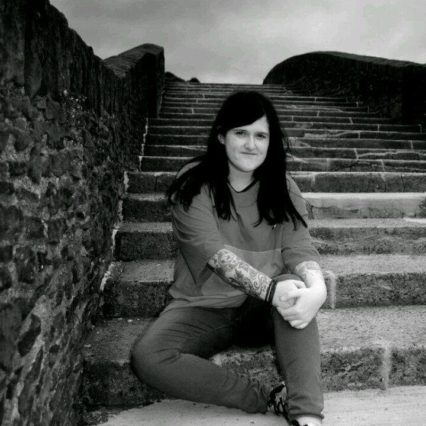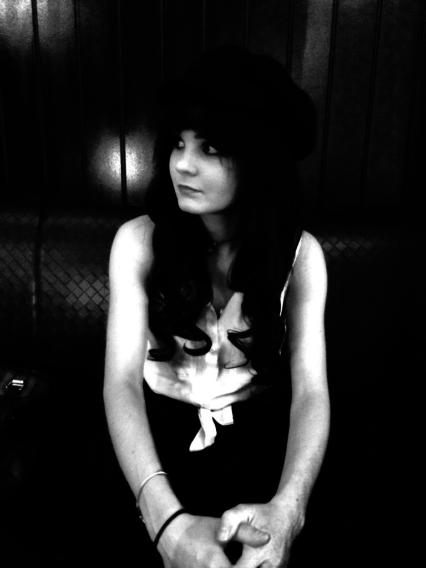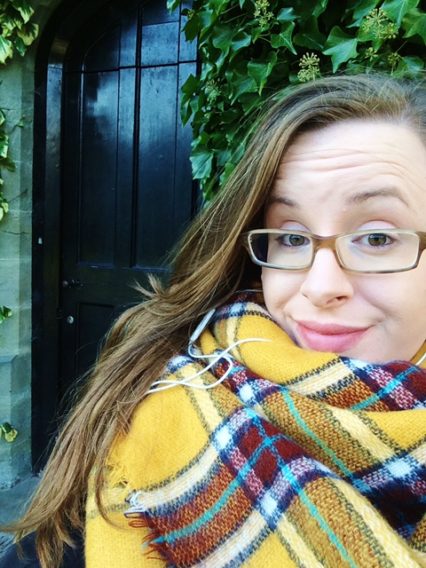Wales Arts Review loves a good conversation about art and literature, so when the opportunity came up to speak with three of the most exciting young writers in Wales today, we thought than rather than speak to us, it might be a better idea to have them speak to each other. Rhian Elizabeth, Christina Thatcher and Natalie Ann Holborow interview each other about their lives and work.
Christina Thatcher: Your debut novel, Six Pounds Eight Ounces, came out with Seren in 2014. Now you’re working on a collection of poetry. Is your process for writing poetry different to your process for writing prose?

Rhian Elizabeth: The main difference between the processes is the speed. Writing fiction is a long process for me. From the initial idea to the character building, to the shaping and the editing. The final product takes a long time for me to get around to finishing, and I often get bored and side-tracked along the way. But I’m completely in love with writing poetry and I’m amazed at the speed poems come to me. They go from idea in head and then to page in seconds, and often the poems I’m the happiest with are the ones that, to me at least, are almost perfectly composed in just a few minutes. Like firing a gun and hitting the target. I like the way poetry looks on the page, too. Fiction is ugly, clumsy, thick. Poetry is delicate and beautiful.
CT: You’ve recently been diagnosed with MS and are writing lots of poetry focused on your illness. What has this experience of writing poetry about this diagnosis been like for you?
RE: Brilliant, liberating, helpful. I suppose I feel like I’ve taken back control of my illness by writing about it. It’s not defining me, I’m actually defining it. And I’ve always found writing cathartic from the very beginning. As a child, writing about difficult things I was going through, my father’s death, other things, and it’s the same now I’m dealing with Multiple Sclerosis. It’s one of the main reasons why I’ve set up a creative writing group for people with health conditions in Cardiff called Word Ward, alongside two other writers. I think writing about and creating something out of a negative is like therapy. The benefits of getting all your shit down onto a piece of paper are massive.
CT: When does writing come easiest to you?
RE: When I’m moving. On a bus, a train, or walking. It’s like my mind is a washing machine and when its switched on and gets going, all my ideas tumble around like dirty, stinking socks.
Natalie Ann Holborow: You’re great at writing poetry “in the moment” or very recently after an event has happened. How do you edit without losing that initial raw feeling?
RE: Very carefully. I try not to edit too much. Because I feel like that initial response is the real thing, however scruffy it may be, however unpoetic it may be- the way it came out is the way it is meant to be, and sometimes the more you edit, the more that real feeling is lost. I think you can try too hard to create the perfect poem and it ends up being something it wasn’t supposed to be and it shows. It jars, it’s not right.
NAH: What made you decide to start writing poetry?
RE: Honestly, it was never my intention to be a poet. I’ve always loved reading poetry but I never saw myself writing it or ever thought I could. I’m a Hay Festival Writer at Work and last year, we had a session with Gillian Clarke and it started from there. I wrote a poem in her workshop and thought, this poem is alright. Perhaps I’ll write another. And another. And now I’ve pretty much got a whole collection together. And it’s really helped me deal with all the Multiple Sclerosis stuff. I don’t think I would’ve ever wrote poems if I hadn’t got sick, or needed that outlet, so in a way it’s been a blessing and not at all a curse.
NAH: How did you feel in the months after your novel was published? Was it easy or hard to start writing again?
RE: I enjoyed floating around on the I’m a published writer with a real book to kiss and cuddle cloud for a while until I realised fuck, I’d better start writing something else. Unless you’re Harper Lee and you’ve written a timeless classic, you need to look for the next thing and not look back. That lovely cloud soon passes over and people no longer give a shit about that novel you once wrote. It took a bit of time, writing a few short stories here and there, but when I finally got my head out of my arse and found a new direction, poetry, I haven’t really looked back since.
Rhian Elizabeth: You’ve had your first poetry collection published, And Suddenly You Find Yourself. Tell us how it felt to have all those poems you’d been working on finally in print and out there in the world for others to read.
 NAH: It was simultaneously the best and worst thing I ever did. On the plus side, I got to go to some amazing places to do readings (Kolkata Book Festival and Hay Festival being absolute highlights) and did two Waterstones launches which is something I’d dreamed of since I was a little girl. On the other hand, letting the book go into the world is terrifying. That book is your baby. “Who’s going to rip it to pieces? Is it terrible? Perhaps I should have swapped some poems for others…” seems to be on a constant loop in your head but if I didn’t let it go out when I did, I would have edited it until the day I go grey and lose all my own teeth. Once there’s no more editing to do, it feels like there’s this void to fill.
NAH: It was simultaneously the best and worst thing I ever did. On the plus side, I got to go to some amazing places to do readings (Kolkata Book Festival and Hay Festival being absolute highlights) and did two Waterstones launches which is something I’d dreamed of since I was a little girl. On the other hand, letting the book go into the world is terrifying. That book is your baby. “Who’s going to rip it to pieces? Is it terrible? Perhaps I should have swapped some poems for others…” seems to be on a constant loop in your head but if I didn’t let it go out when I did, I would have edited it until the day I go grey and lose all my own teeth. Once there’s no more editing to do, it feels like there’s this void to fill.
RE: You recently went on a tour of India with Parthian books. Did you find much inspiration while you were there and can we expect any poems about your experiences?
NAH: I’m trying to rein myself in from writing all of my next poems on India! I fell head over heels for the place; the chaos, the people, the sensory onslaught in every valley, every city and every village. My India poetry is in the Valley, City Village print version of Wales Arts Review and I’m sure it’ll pop up in my writing again. Take me back!
RE: You’re a great performer of your poetry and often you read your poems out from memory, as opposed to off the page. Do you have any tips for poets who perhaps struggle with the performance element?
NAH: That’s a really kind thing to say, particularly as I often feel the opposite! I’m trying to make a conscious effort this year to immerse myself in performance poetry and learn from others. One thing I do find really helps is getting into character, even if the ‘character’ (or reader’s voice) is just yourself. I think this is why I try and read the Greek mythology ones with a little more energy – feel what they’re feeling and really believe every word you’ve written.
Christina Thatcher: Your new collection, And Suddenly You Find Yourself, covers a lot of ground – mythology, fairy tales, family relationships and more. Which of the themes did you find most challenging to write and why?
NAH: For me, it was The Lost One, which is one of the shortest but the only one written ‘in the moment’. I knew I needed to write to distract myself, but the feeling was so raw those were the only words I could get onto paper. That and Burnt Toast, one of the few I’ve written about anorexia. Again, I think it’s because it is something that never really fully goes away, so it’s still hard to distill something like that into words without dulling down a very real and raw experience.
CT: Can you talk a little bit about your next writing project?
NAH: I’m currently researching, interviewing and writing for a guide on Type 1 diabetes for those who struggle with the diagnosis. There needs to be more of a positive ‘can-do’ attitude, and I hope it will help others and make them feel more hopeful for the future. It’s both inspiring and heartbreaking to hear the range of experiences from the interviews I’ve done so far. Non-fiction is a nice way to ease the pressure I currently associate with poetry-writing now that the collection’s done.
CT: Which writer or writers continue to inspire your work and why?
NAH: So many! I fell in love with Sylvia Plath and Dylan Thomas first and foremost. Rebecca Goss’s beautiful collection Her Birth is one I return to over and over, Brian Patten’s Love Poems is probably one of the most well-worn books on my shelf. Seeing Kate Tempest live last year honestly moved me to tears; that woman is absolutely electrifying onstage (I deliberately didn’t name Parthian and Seren poets here because there’s just too many I adore and whose collections I keep returning to! My bank card hates me but my bookshelf has never looked so good).
Rhian Elizabeth: You’ve published a collection of poetry, More than you were, focusing on your father’s death of a drug overdose. How do you manage dealing with your own grief and then the responses of others to what you’ve created and written from that grief? Is it often a burden or something positive that ultimately helps you?

CT: It can sometimes be a challenge but, more often than not, engaging with other people’s responses to my grief and these poems is a very uplifting experience. I wrote the collection during a dark and lonely time in my life – I’d lost my Dad and I was alone in my grief both physically (since I was removed from my family in the States) and mentally (since few people I knew could relate to losing a young father to an addiction). Also, grieving is an utterly and unexpectedly chaotic experience – I was all over the place! So, writing the collection anchored me, helped me to reign in the insomnia, the anxiety, the food cravings, the social fear that came from grieving. And now, reading the poems gives me a precious opportunity for connection. Most people at readings are touched by the work – the heavy weight of the subject matter and, what I hope is, the craft of these tiny poems which gives them a glimpse into my life. But, there are always a few people who come up to me with hushed tones to say that they are going through something similar. Or who offer a long hug and a thank you for talking about something they never could. It is these moments when I believe that I’m on the right track. It feels good knowing that—out of my Dad’s death and my tumultuous grief— at every reading I can create something positive, expose taboos, bring people in and learn others’ stories.
RE: You’re an American living and writing in Wales. How does the poetry scene differ there and here?
CT: Wow, that is a great question! I am afraid I am not the best person to answer this as, when I was old enough to attend poetry events in the States, I was also in a relationship with someone who did not approve of poets. So, I attended very few and wrote in secret before I moved to the UK. However, the poetry events I did attend in Philadelphia were different to Cardiff’s events, more serious and stuffy somehow. I also noticed, even from the audience, this edge of competitiveness. This sense that people were eyeing each other up, searching for weakness, gilding themselves slowly – a sense of superiority exposed both in their readings as well as through conversations overheard around the wine and cheese. To be fair, it may have only been the readings I got to go to, but that is the impression I got. This was confirmed, in one way, by an American friend who visited Wales. She came with me to a poetry reading on her first night in Cardiff and, as we walked out the door, she turned to me and said: God, they’re so nice here! And, yes, I would say the scene here is that – welcoming, warm, supportive, communal. There are loads of literary opportunities in Cardiff too – at least one open mic night or writer’s group every week, often more. And the people at these events are there to listen, learn, read, laugh, build friendships and more. Poetry is for everyone in Wales and that is something I love and will always champion.
RE: Do you plan to continue writing about the themes you’ve been focusing on in your recent work, or is there something completely different in the pipeline?
CT: Well, to be honest, I will probably never stop writing about grief – losing a parent is the kind of thing you carry with you. But the bereavement/father poems are fewer now and the pipeline is full of exciting new things. Most significantly, is my second poetry collection which is already nearing completion. This collection contains all the things which came out of my grief – it reflects the questioning and ‘carrying on’ process. This includes my identity crisis, new concept of family, appreciation for home landscapes, what I learned about myself as a woman, my new desire to get married (before my Dad died I NEVER thought I’d want to marry) and more. There are lots of thematically linked poems about construction and building, communication and letter writing, the sea and drowning. I’m excited to continue work on this collection and see where it leads!
Natalie Ann Holborow: You’re very involved in the poetry community in Cardiff and are good at sharing your passion for writing to motivate and support others. How important have workshops and groups been in writing your own work?
CT: I actually LOVE attending writing workshops and wish I could do it all the time. I find the group setting inspiring and the new poems and prompts stimulating. When I have the opportunity to attend any kind of writing workshop or group I always come away with handfuls of poems! That being said – most of the workshops I have time to attend now, I am actually leading which means the dynamics are a bit different. I always count myself as a teacher first and a writer second. So, when I’m leading workshops or groups I tend not to write because I’m watching the clock, preparing the next activity, checking that everyone is writing, formulating the questions for the group and so on. That being said, there are occasional times, especially at Roath Writers (my community writing group) or the Death Writing workshops I’ve led, where I am struck with a desperate need to write as well. And, then, I take those 20 minutes afforded to my participants and write too. A few poems in the collection were written in this way, having their first airing, in their most basic form, to a group of supportive friends and enthusiastic writers. So, I guess, although I don’t write much in my own workshops, when I do it’s a useful and uplifting experience.
NAH: What’s been your favourite launch event so far?
CT: Brilliant question but such a difficult one to answer! In terms of venue, I have to say the Newcastle reading topped it – I read with Emily Blewitt and Lisa Matthews in the basement cinema room of a gorgeous teahouse. Although Chapter One Books in Manchester where I read with Rebecca Roy comes a close second – it’s an independent book shop with a fountain inside! But, I think in terms of overall experience, I would have to say it was in Costa Rica where I read at a school called the Instituto Educativo Moderno. I had a two hour slot where I could read poems from the collection and answer questions from 11-13 year olds. It was the first time I’d heard my poems translated and read in Spanish too, by the wonderful Esteban Alonso Ramirez. So, that in itself was an incredible experience. But, the students! Their questions were so thoughtful, heartwarming, sincere and exposing: ‘Where do you find your confidence?’, ‘How does poetry make your life better?’, ‘My therapist tells me I should write. How do you think it can help me?’, ‘How do you feel about talking about your Dad now that he’s dead?’, ‘What does your family think of your poems?’. Reading poems in their classroom, answering their questions and being with them that day was nothing less than magic.
NAH: Writing poetry often involves a lot of public speaking and getting your name out there. What advice would you give to a writer who enjoyed getting things on paper but found it hard to share things publicly
CT: Start small. Reach out to family and friends first. Read at some open mics. Speak to local event hosts who you know to see if they can give you a chance to read your work in a featured slot (10-20 minutes). Ask them if they know others who may be interested. Tweet to people, writing groups, organisations and more who may be keen. Don’t ‘sell’. Instead, ‘give’. Offer a poem, enter a conversation, make recommendations. Give more advice, share others’ work, promote poets you love. Especially with Twitter, I work on a 1 to 5 rule at the moment. For every time you ‘sell’ or ‘promote’ yourself you should give something, share something, promote someone at least 5 times. It keeps the balance right. When I’m not touring, I’ll go back to a 1 to 10 rule. If you start in this way, your name should get out there. It’s a slow process and it takes time but keep plugging away. Most things in life that are worth doing take time.
You can see Christina Thatcher, Natalie Ann Holborow & Rhian Elizabeth this Thursday at the Open Space event in Cardiff Central Library on 20th July at 5.45.












